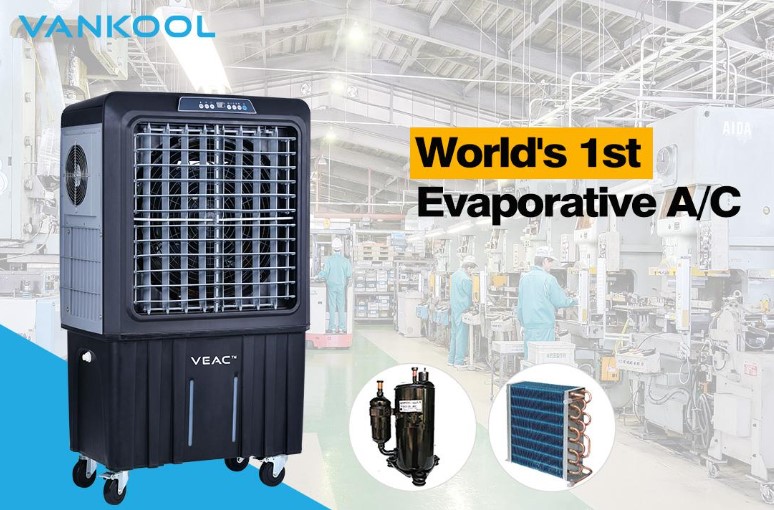
Evaporative air conditioners, also known as swamp coolers, are a popular alternative to traditional air conditioning units. These cooling systems work by using the natural process of evaporation to cool and humidify the air. Here, we will explore how evaporative air conditioner work, their benefits, and their drawbacks.
How do Evaporative Air Conditioners work?
Evaporative air conditioners use a simple, yet effective process to cool the air. First, they draw warm air from outside the building through a filter. This filter helps to remove any dust, pollen, or other pollutants from the air. The air is then passed through a set of moist pads, which are kept wet by a water pump. As the air passes through the moist pads, the water evaporates, which cools the air. The cool air is then circulated back into the building through a fan.
Benefits of Evaporative Air Conditioners
- Energy-efficient: Evaporative air conditioners are much more energy-efficient than traditional air conditioning units, as they use only a fraction of the energy to cool the same area.
- Cost-effective: Evaporative air conditioners are generally much less expensive to purchase and install than traditional air conditioning units.
- Environmentally friendly: Evaporative air conditioners use natural processes to cool the air, rather than relying on harmful refrigerants like traditional air conditioning units.
- Humidification: Evaporative air conditioners not only cool the air, but they also add moisture to it. This can be beneficial in dry climates, as it helps to alleviate dry skin, eyes, and throat.
- Easy maintenance: Evaporative air conditioners require very little maintenance, as they have no compressor or refrigerant to worry about. Regular cleaning of the water reservoir and pads is all that is needed to keep the unit running smoothly.
Drawbacks of Evaporative Air Conditioners
- Humidity: While evaporative air conditioners can add humidity to the air, they may not be suitable for humid climates. In areas with high humidity, the added moisture can make the air feel heavy and uncomfortable.
- Limited cooling capacity: Evaporative air conditioners are not as effective as traditional air conditioning units in cooling large areas. They are most effective in small spaces, such as bedrooms or living rooms.
- Water consumption: Evaporative air conditioners use water to cool the air, which means that they need to be connected to a water source or have a water reservoir that needs to be refilled regularly.
- Maintenance: While evaporative air conditioners require very little maintenance, the pads and water reservoir will need to be cleaned regularly to prevent bacteria and mold growth.
- Noise: Some evaporative air conditioners can be noisy, which can be distracting, especially if you are trying to sleep or concentrate.
Pros of Evaporative Air Conditioner:
- Energy Efficiency: Evaporative air conditioners are much more energy-efficient than traditional air conditioning units as they use only a fraction of the energy to cool the same area. This results in lower energy bills and reduces carbon footprint.
- Cost-effective: Evaporative air conditioners are generally much less expensive to purchase and install than traditional air conditioning units, which makes them a great option for budget-conscious consumers.
- Environmentally friendly: Evaporative air conditioners use natural processes to cool the air, rather than relying on harmful refrigerants like traditional air conditioning units. This makes them a more eco-friendly option for cooling your home or office.
- Humidification: Evaporative air conditioners not only cool the air but they also add moisture to it. This can be beneficial in dry climates, as it helps to alleviate dry skin, eyes, and throat.
- Easy Maintenance: Evaporative air conditioners require very little maintenance, as they have no compressor or refrigerant to worry about. Regular cleaning of the water reservoir and pads is all that is needed to keep the unit running smoothly.
Cons of Evaporative Air Conditioner:
- Humidity: While evaporative air conditioners can add humidity to the air, they may not be suitable for humid climates. In areas with high humidity, the added moisture can make the air feel heavy and uncomfortable.
- Limited Cooling Capacity: Evaporative air conditioners are not as effective as traditional air conditioning units in cooling large areas. They are most effective in small spaces, such as bedrooms or living rooms.
- Water Consumption: Evaporative air conditioners use water to cool the air, which means that they need to be connected to a water source or have a water reservoir that needs to be refilled regularly. This can increase water bills and may not be practical in areas with water scarcity.
- Maintenance: While evaporative air conditioners require very little maintenance, the pads and water reservoir will need to be cleaned regularly to prevent bacteria and mold growth. Neglecting maintenance can lead to unpleasant odors and health hazards.
- Noise: Some evaporative air conditioners can be noisy, which can be distracting, especially if you are trying to sleep or concentrate. It is important to choose a unit that is designed to operate quietly.
Conclusion
Evaporative air conditioners can be a great alternative to traditional air conditioning units. They are energy-efficient, cost-effective, and environmentally friendly. They can also provide added humidity to dry climates, making them a great option for those with dry skin, eyes, or throat. However, they do have some drawbacks, including limited cooling capacity, water consumption, and maintenance. It is important to weigh the benefits and drawbacks carefully when deciding whether to install an evaporative air conditioner in your home or office. If you live in a dry climate and are looking for an affordable and eco-friendly way to cool your home, an evaporative air conditioner might be the perfect solution for you.
